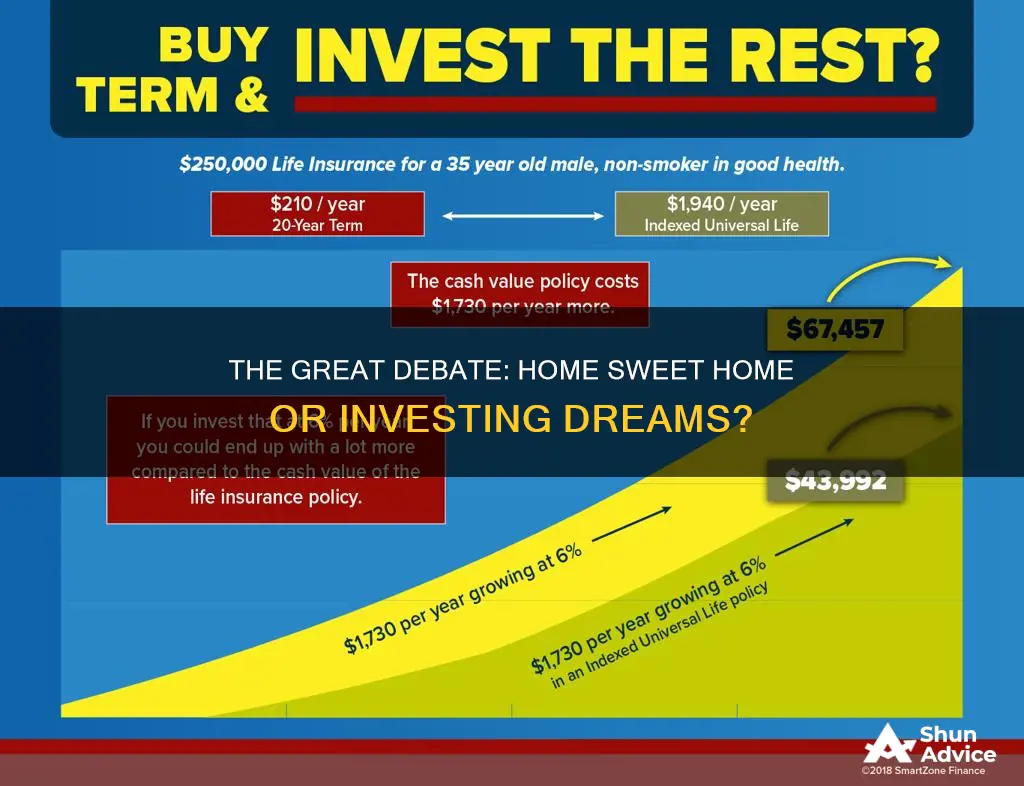
There are many factors to consider when deciding whether to buy a home or invest. Some people argue that buying a home is a good investment, while others claim it is a terrible investment. On the one hand, real estate values tend to increase over time, and owning a home can provide a sense of security and stability. Additionally, buying a home can be a type of forced savings as you build equity with each monthly mortgage payment. On the other hand, owning a home comes with various costs such as property taxes, maintenance, insurance, and utilities, which can add up over time. These costs can outweigh the potential appreciation in the property's value.
Another option to consider is investing in stocks or other financial instruments, which may offer higher returns over the long term with less maintenance and hidden costs. However, the stock market can be more volatile and unpredictable compared to the real estate market. Ultimately, the decision to buy a home or invest depends on various factors, including an individual's financial situation, risk tolerance, and personal preferences.
| Characteristics | Values |
|---|---|
| Primary purpose | A home provides shelter, whereas investments are intended to make a profit. |
| Control over sale | With a home, you'll likely sell when it no longer fits your lifestyle, whereas with an investment, you can sell whenever it's convenient in terms of return on investment. |
| Appreciation | Historically, real estate values tend to increase over time, but appreciation is not guaranteed. |
| Carrying costs | Homes involve carrying costs such as monthly mortgage payments, real estate taxes, insurance, utilities, and maintenance. |
| Cash flow | Homes generally don't offer cash flow unless they are investment properties that are rented out. |
| Liquidity | Homes are less liquid than investments like stocks, as they can take longer to sell. |
| Diversification | It's easier to diversify with stocks than with real estate, especially with mutual funds. |
| Access | Real estate requires a substantial amount of money upfront, while investing in stocks can be started with a small amount. |
What You'll Learn

The pros and cons of owning a home
The decision to buy a home or invest depends on your situation and plans. Here are the pros and cons of owning a home:
Pros of Owning a Home
- Long-term investment: Historically, real estate values tend to increase over time, and this is still true today. A house can be a valuable asset and a nest egg.
- Privacy: You have more privacy as a homeowner since you don't have a landlord inspecting the property. You also have more freedom to make changes to the property.
- Predictable costs: You know how much your mortgage and property taxes will be each month, making it easier to plan your finances.
- Tax benefits: In some countries, such as the United States, homeowners may qualify for tax deductions on property taxes and mortgage interest.
- Customisation: As a homeowner, you have the freedom to renovate and customise your home to your liking.
- Pride of ownership: For many, owning a home is a source of pride and a symbol of achievement.
Cons of Owning a Home
- Long-term commitment: Buying a home often requires a long-term financial commitment to maximise financial gains. It can be challenging to move to a new location.
- Maintenance costs: Homeowners are responsible for all maintenance and repair costs, which can be unexpected and expensive.
- Down payment and upfront costs: Most home purchases require a down payment and involve various upfront costs, such as closing costs and moving expenses.
- Time and effort: Owning a home requires ongoing time and effort for maintenance and repairs.
- Limited liquidity: Selling a house can take a significant amount of time, and you may not have control over the timing of the sale.
- Potential negative impact on investment: During times of financial crisis or a declining housing market, the value of your home may drop, resulting in a negative return on your investment.
Black People: Investing Fears
You may want to see also

The pros and cons of investing
Investing in stocks can be a powerful way to build wealth, but it's important to understand the potential benefits and drawbacks. Here are some pros and cons of investing to consider:
Pros of Investing:
- Building Wealth: Historically, the stock market has delivered generous returns over the long term, with annual gains averaging close to 10%. This allows investors to stay ahead of inflation and grow their assets.
- Accessibility: You don't need a large sum of money to start investing in stocks. Many brokers allow commission-free trades, and some don't require account minimums. You can also buy fractional shares if the stock you want is too expensive.
- Diversification: Investing in stocks allows you to diversify your portfolio by investing in different types of assets, sectors, and geographies. This helps to lower your overall investment risk.
- Liquidity: Stocks are highly liquid, meaning you can sell them quickly and turn them into cash with relatively low transaction costs. This is especially beneficial if you need access to your money in an emergency.
- Income: Investing in stocks can provide income through price appreciation and dividends. Dividends are distributed by companies to their shareholders as a portion of their profits.
Cons of Investing:
- Risk: Investing in stocks comes with risk. Stock prices can fluctuate dramatically, and there is no guaranteed return on your investment. You could lose your entire investment if a company performs poorly.
- Time and Research: Investing in stocks requires time and effort to research and monitor your investments. You need to analyse financial statements, annual reports, and industry news to make informed investment decisions.
- Taxes: Profitable stock sales are typically subject to capital gains taxes. Additionally, if you receive dividends from your stocks, you may need to pay taxes on those distributions.
- Emotional Roller Coaster: The stock market can be volatile, and it's easy to get caught up in the emotional ups and downs of investing. Individuals often buy out of greed and sell out of fear, which can lead to unwise investment decisions.
- Competition: When investing in stocks, you compete with institutional investors and professional traders who have more time, knowledge, and sophisticated tools at their disposal.
While investing in stocks offers the potential for significant financial gains, it's essential to carefully consider both the pros and cons before making any investment decisions. It's crucial to understand your financial goals, risk tolerance, and time horizon before committing your money.
Poor People Don't Invest: Here's Why
You may want to see also

The costs of owning a home
There are several costs associated with owning a home, and these can be divided into regular and irregular expenses. Regular costs include mortgage payments, council rates, home insurance, and utility bills. Irregular costs include maintenance and repairs, renovations, and breakages.
Regular Costs
Home loan repayments are typically one of the largest regular costs for homeowners. These can be constant (fixed-rate) or variable, depending on the type of loan and interest rate. Account-keeping or package fees are also usually included in home loans, and these can add up over time.
All homeowners are required to pay council rates, which are calculated based on the value and size of the property and land. These rates fund civic services and infrastructure such as footpaths and public parks. If you live in a unit, apartment, or townhouse, you may also need to pay body corporate or strata fees, which cover the upkeep of common areas, utilities, and structural repairs.
Home and contents insurance is another essential expense, protecting your property and belongings from damage or loss. Lenders typically require this insurance before financing your purchase, and premiums are often included in your mortgage payment.
Lastly, as an owner-occupier, you will be responsible for all utility costs, including water, electricity, and gas. These expenses can fluctuate depending on usage.
Irregular Costs
Maintenance and repairs are inevitable parts of homeownership. While some tasks can be done yourself, others may require hiring a tradesperson, which can be costly. Larger-scale maintenance, such as pest control or HVAC system inspections, should be done regularly to prevent more expensive issues down the line.
Breakages and repairs are also common and can range from simple fixes to more complex issues requiring qualified professionals. Staying on top of maintenance can help reduce the frequency of breakages.
Renovations are another irregular cost that can significantly impact your budget. These projects can range from simple cosmetic updates to more extensive remodelling, which involves structural changes to your home. Planning and budgeting are crucial for renovations to avoid cost blowouts.
In summary, owning a home comes with a range of ongoing and unexpected costs. By understanding and preparing for these expenses, you can better manage your finances and avoid financial strain.
TD Ameritrade: Your Investment Companion
You may want to see also

The costs of investing
Investing in property comes with a multitude of costs, which can be split into upfront costs and ongoing costs.
Upfront Costs
The upfront costs of investing in property include the deposit, lender's mortgage insurance (LMI), stamp duty, conveyancing fees, building and pest inspection, and mortgage registration fees. The size of the deposit depends on the value of the property, with most lenders accepting a minimum of 10% of the purchase price. LMI is necessary if you are unable to put down a deposit of 20% or more and can cost thousands of dollars. Stamp duty is a tax imposed by the state government and varies depending on the property's price, location, and purpose. Conveyancing fees, which cover the legal process of transferring ownership, typically range from $500 to $1000. Building and pest inspection reports can cost between $300 and $1000, depending on the area and size of the house. Mortgage registration fees, paid to state and territory governments, range from $130 to $200.
Ongoing Costs
Ongoing costs of owning an investment property include repairs and maintenance, body corporate or strata fees, landlord's insurance, property management fees, utilities, council rates, and mortgage repayments. Repairs and maintenance expenses can vary widely depending on the property's condition and age. Body corporate or strata fees are applicable for units or townhouses within a complex and are used to maintain shared amenities. Landlord's insurance covers the property against loss or damage caused by tenants and typically costs between $1000 and $2000 annually. Property management fees are paid to a property manager who markets the property, deals with tenants, collects rent, and handles maintenance and complaints. Utilities such as electricity, gas, and water can be covered by the landlord or passed on to the tenant. Council rates, paid annually to the local government, can cost thousands of dollars per year. Mortgage repayments will depend on the loan amount, term, type, and servicing fees.
It is crucial to carefully consider and budget for these costs before investing in property to ensure positive cash flow and a realistic estimate of the expected return.
Smart Strategies to Invest Half a Million Dollars for Regular Income
You may want to see also

The risks of owning a home vs. investing
Risk of Owning a Home
Homeownership is a dream come true for many, but it's important to be aware of the risks involved. Here are some of the key risks associated with owning a home:
- High upfront costs: Purchasing a home typically requires a significant down payment and closing costs, which can range from 2% to 5% of the property's purchase price.
- Depreciation: Unlike other investments, homes can depreciate over time, especially if they are not well-maintained. This can lead to a loss of equity and a decrease in the home's value.
- Illiquidity: Homes are not easily converted into cash, and selling a home can take time and incur additional costs.
- Maintenance and repair costs: As a homeowner, you are responsible for all maintenance and repairs, which can be costly and time-consuming.
- Difficult to move: Homeownership can be an anchor if you want or need to relocate, as selling and buying a new home is a complex and expensive process.
- Fluctuating property values: Property values can decrease due to various factors such as the local job market, interest rates, proximity to amenities, or undesirable changes in the neighbourhood.
- Mortgage risks: Taking out a mortgage comes with its own set of risks, including the possibility of falling behind on payments, changes in interest rates, and the risk of foreclosure if you are unable to make payments.
- Taxes and insurance: Homeownership often involves additional costs such as property taxes, homeowners insurance, and homeowners association dues, which can add up to a significant expense.
Risk of Investing
Investing also carries its own set of risks, and it's important to understand these before committing your money. Here are some of the key risks associated with investing:
- Market risk: The value of your investments can fluctuate due to market conditions, and you may lose some or all of your investment if the market takes a downturn.
- Business risk: The performance of your investments can be affected by corporate decisions, such as expansion plans or mergers, which may not always have a positive outcome.
- Political and currency risk: International investments are subject to political instability and currency exchange rate fluctuations, which can impact their value.
- Liquidity risk: Some investments are harder to convert into cash, and you may not be able to access your money when needed.
- Concentration risk: Investing all your money in a single asset or a small number of assets increases the risk of loss. Diversification is essential to mitigate this risk.
- Reinvestment risk: You may not be able to reinvest the returns from your investment at the same rate of return, affecting your overall profitability.
- Default risk: Investing in bonds carries the risk of the issuer defaulting on their debt obligations, potentially resulting in losses for investors.
- Model risk: The use of financial models to make investment decisions carries the risk of incorrect assumptions or data, leading to inaccurate predictions and potential losses.
In conclusion, both owning a home and investing carry significant risks. It is essential to carefully consider and understand these risks before making any decisions. While homeownership provides stability and control, investing offers the potential for higher returns but with a higher level of risk. Diversification and risk management strategies can help mitigate some of these risks, but it is important to remember that no investment is completely risk-free.
Investing in People: Debt as an Asset
You may want to see also
Frequently asked questions
Owning a home has plenty of intangible benefits—pride of ownership, the freedom to customise with renovations, and putting down roots for your family.
A home can be a liability as it takes money out of your pocket. You have to pay the mortgage, insurance, property taxes, maintenance, utilities and more.
Stocks are highly liquid investments that can both build long-term wealth and provide income via dividends.
Investments in the stock market often experience short-term volatility that can lead to emotional decisions to buy or sell at unwise times.







